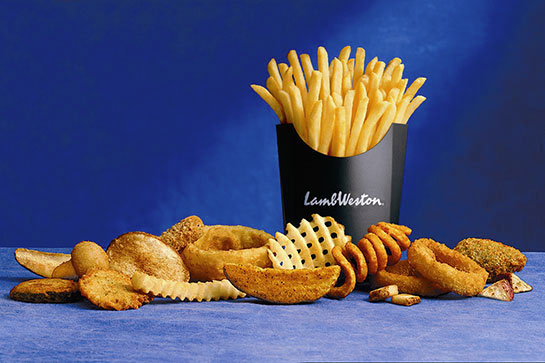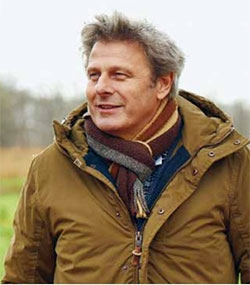Well on its way to reaching 2020 target goals, Lamb Weston/Meijer has achieved continued reduction in the use of water, energy, emissions and waste, according to the 2012-2014 Sustainability Report just issued by the company. “Creating Shared Value” is the theme of the 72-page document.
The Kruiningen, Holland-headquartered frozen potato product specialist operates five plants in the Netherlands, UK and Austria with combined capacity of 700,000 metric tons. As a unit of ConAgra Foods, one of the world’s largest diversified foods companies, parent company Lamb Weston’s annual global sales are approximately $2 billion.

In the two-year period surveyed the company sent virtually no waste to landfills, as 99.7% of byproducts in the waste stream, amounting to 300,000 tons of largely potato-based materials, were usefully utilized.
During the same period potato utilization increased by 4.3%, water savings amounted to 285 million liters per annum (7%), and direct energy use was cut by 21%. Meanwhile, the company has revised recipes to produce healthier-eating finished products.
“Our future goals include reducing both the salt and the fat content in our seasoned specialty potato products,” stated the Sustainability Report. “For salt, we are targeting the 2017 FSA salt level of a maximum of 0.69% of frozen product. This means that we need to work on reformulating part of our seasoned potato products for foodservice. All retail frozen products produced for the UK market – which are mostly private labels – comply with the 2012 salt target of a maximum of 0.49% salt. Most of our own branded-seasoned retail frozen products typically contained 0.5% salt, since the launch of our Lamb Weston retail range in 2007. Salt reformulation involves changing the recipe of the crispy coating that covers our seasoned specialty products.”
The challenge, however, is to gradually reduce salt levels without compromising on taste. At the same time, the company’s product development team is looking at ways to reduce the amount of oil needed in the par-frying process. The average oil usage per ton of product produced closely reflects the average oil content in its par-fried potato products.
Oil use has decreased since 2008, from 6.2% to 5.8% in FY 2014, partly due to better oil recovery systems. The other reason is attributed to changes in product mix, namely a higher volume of thick-cut products, which have lower oil content.
“This is an area of opportunity we will explore when developing potato products with less fat. Another area is developing new potato products suitable for oven cooking, resulting in lower oil content of the product as consumed. We will repeat the nutrition and health training that we ran in 2014 to ensure the information sticks,” stated the report. “We want to help customers move towards frying in healthier oils and serving smaller portion sizes. To achieve this, we need to inform and educate our customers on the topics of nutrition and health, not preach.”
Let the Sunflower Oil Shine! “French fries are made from two main ingredients: potatoes and oil,” stated the Sustainability Report. “In the past, we fried all our potatoes in palm oil. In 2012, however, we decided to start frying our LambWeston-brand products in much healthier oil: sunflower oil. This amounts to more than half of our total product volume. And because sunflower oil contains very little saturated fat (only 12%), in one move we cut 75% of the saturated fats from half our product range.”
“French fries are made from two main ingredients: potatoes and oil,” stated the Sustainability Report. “In the past, we fried all our potatoes in palm oil. In 2012, however, we decided to start frying our LambWeston-brand products in much healthier oil: sunflower oil. This amounts to more than half of our total product volume. And because sunflower oil contains very little saturated fat (only 12%), in one move we cut 75% of the saturated fats from half our product range.”
This change involved significant investments, including testing and adapting equipment across the company’s network of factories, which has altered packaging and resulted in higher purchase prices.
“Our healthy frying oils contain a maximum of 12% saturated fat, and only 1% trans fat,” the Sustainability Report pointed out. “Over the past three years we have significantly increased the use of healthy frying oil, from only 30% in FY 2012 to 76% in FY 2014. This includes all of our Lamb Weston-brand frozen potato products – par-fried in sunflower oil – and a large part of frozen potato products produced for private label customers and fried in a healthy oil blend. The remaining 24% is fried in CSPO palm oil for, mostly, private label customers where palm oil is included in the agreed product specification.”
The Key Challenge
Sunflower oil is high in unsaturated fat. While this characteristic means it is healthy, it also means it’s liquid at room temperature. As such, frozen french fries processed in sunflower oil often look and feel “fatty” when they are removed from packaging for preparation.
They can also react slightly differently during frying, which requires restaurant operators to pay extra attention during the final frying stage. For example, there can be a little more fryer dust, which needs to be skimmed off the oil regularly, to prevent degradation.
“These practical issues require energy, patience and knowledge from our production and sales employees,” spelled out the report. “While some other manufacturers continue to use palm oil – or partially returned to palm oil – we remain committed to making the healthiest potato products possible. We offer our customers technical support to optimize their kitchen fryer operations from a handling, storing, cooking and serving perspective. Where it will be more difficult to develop products with a lower fat content compared to similar cut size, we ensure that the oil used is the healthiest option available for frying, and advise customers to use healthy oil as well. We believe our biggest challenge is to educate the majority of foodservice customers on the importance of closely following the advised cooking instructions when frying. Most operators fry to their personal preference, and tend to fry to a golden brown color rather than to a light golden yellow color – and some even fry our products twice.”
Field observations made by Lamb Weston/Meijer personnel confirm that fries are often cooked too long, absorbing more oil than necessary to produce a top quality serving. As such a major educational challenge in this area is required, and thus the company will explore how best to collaborate with customers in the next few years.
“This generates a win-win for all, as frying for the shortest possible time gives better product quality, a healthier product, requires less oil, less time from operators, uses less electricity, and thus saves costs,” according to Lamb Weston/Meijer.
Comments from CEO Bas Alblas
 “Our people make it happen,” says Lamb Weston/Meijer CEO Bas Alblas upon release of the company’s 2012-2014 Sustainability Report.The extensive 2012-2014 Sustainability Report covers in detail the company’s “Sustainable Six” core areas: Water; Energy & Emissions; Potatoes & Waste; Employees; Food Safety & Quality; Nutrition & Health. It begins with an interview with CEO Bas Alblas, excerpts of which follow.
“Our people make it happen,” says Lamb Weston/Meijer CEO Bas Alblas upon release of the company’s 2012-2014 Sustainability Report.The extensive 2012-2014 Sustainability Report covers in detail the company’s “Sustainable Six” core areas: Water; Energy & Emissions; Potatoes & Waste; Employees; Food Safety & Quality; Nutrition & Health. It begins with an interview with CEO Bas Alblas, excerpts of which follow.
A few years ago you launched the Sustainable Six. Why did you choose these six themes, and have they really proven to be sustainable?
When we were developing our sustainability strategy, we selected the Sustainable Six based on two criteria: their relevance to our company and the industry, and whether we could truly make an impact through creating more sustainable operations. It has worked on both fronts.
Have they proven to be sustainable? Yes, we are progressing according to our sustainability 2020 goals and I am happy with both the tangible and intangible results.
How important are partnerships and collaboration in terms of reaching your goals?
Partnerships are vital. Our approach is to look along the entire supply chain, not just the steps we have direct involvement in, but also those steps before and after we’re involved. To make that happen, you need to work closely with your partners and suppliers to develop solutions to create a sustainable, effective supply chain.
We also believe that one plus one can equal three, not two. In other words, collaborating with suppliers and customers can help us develop many more solutions than we would if we worked on them individually.
It has been said that sustainable food could be a recipe for food security and environmental protection. Do you agree?
My first reaction would be that I don’t agree with the concept of sustainable food. If you label things, you by definition exclude. I believe in practices and processes that are carried out in such a way that they result in sustainable products.
Nevertheless, I think there are important issues at stake here. There is a strong link between the sustainable initiatives we undertake, and the need to have enough food in the future. Sustainable practices can only help. The industry has to be able to develop processes that continually increase its food output without negatively impacting the environment.
People may wonder if french fries can ever really be sustainable at all. What’s your opinion on this?
We make processed potato products, and are closely connected with agriculture – or as we like to say: “We are rooted in potatoes.” The potato is nutritious, versatile and affordable, as well as being the third largest food crop globally. Potatoes can be grown, stored and produced sustainably. They need less land, less water and less energy – while delivering more calories per hectare – than any other staple crop, including rice, wheat and maize. Potatoes are allergen-free by nature, and most potato products we manufacture are also allergen-free. That’s all pretty sustainable.
And while it’s tempting to assume that french fries equate with a lack of nutrition because they are fried, we believe that they fit within a balanced, healthy and varied diet. Over time we’ve moved toward healthier products, by switching our LambWeston-brand products from palm oil to healthier sunflower oil, and by reducing salt levels in our seasoned products. We also talk regularly with our customers about the importance of providing consumers with the right information to make their own decisions, in an informed way.
Scarcity of water will undoubtedly have a real impact on the food industry in the future. What do you see as being the major challenge in this area?
“I think water is undervalued, although I’m not necessarily advocating that the price of water should increase. In some areas where we are active, water is so cheap that it is very difficult to justify the technological investments needed to reduce our water use. We are committed to reducing the water used directly in our facilities, so we will continue to look for ways and investments to achieve this. While there’s a lot of discussion that water will be scarce, I see very little government urgency to do something about it.
Are you satisfied with your sustainability achievements over the last three years?
I’m proud of what we have achieved, and I’m proud that we have people in the organization that show the initiative and self-motivation to get a program like this not only started, but also implemented. The achievements we have made over the last few years come from the ambitions of those who believed we had to reduce our energy and water use significantly, or develop more sustainable processes, not because they were asked to. So far, we are on track to reach our goals by 2020.
Finally, what are your most important goals for the next three to five years?
Our focus in the coming few years will be to remain disciplined and achieve our 2020 targets as defined for our Sustainable Six.




